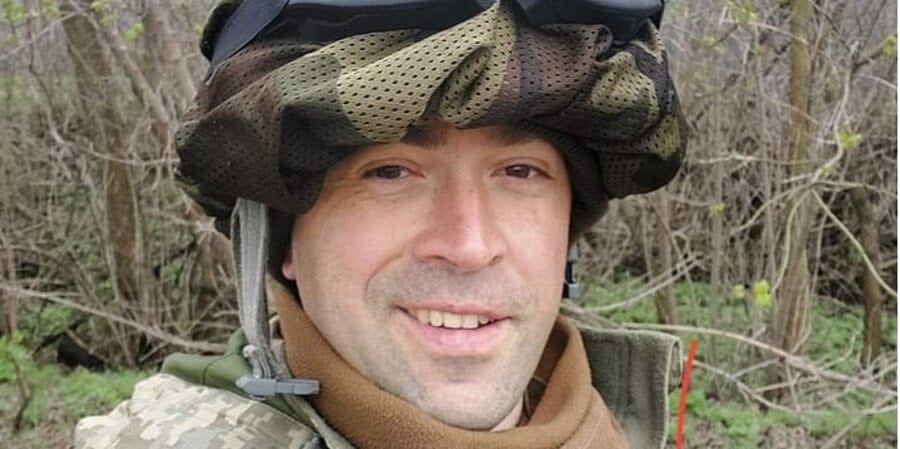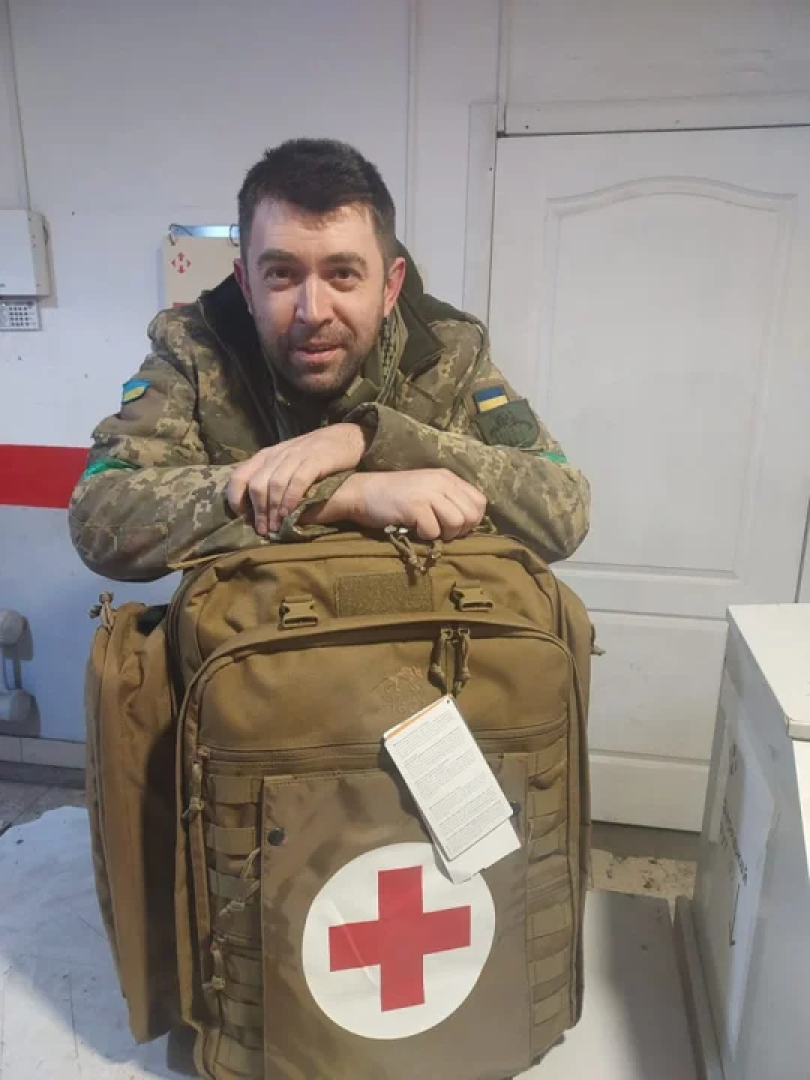How Oleksiy Lyubetskyi went from businessman to combat medic

NV continues its series on the lives and struggles of Ukrainians on the anniversary of the full-scale Russian invasion, which began last year on Feb. 24.
Oleksiy Lyubetskyi is a combat medic of the fire support company of the 68th Battalion of the Transcarpathian Territorial Defense. Before the start of the full-scale war, he was a businessman. He worked with an Israeli company and was involved in smart city development. As a hobby, he restored a local narrow-gauge railway and organized gastronomic tours of Transcarpathia. He joined the ranks of the territorial defense on the second day of the invasion, Feb. 25.
During his service, Oleksiy Lyubetskyi has given dozens of interviews to TV channels and newspapers from all over the world, speaking with reporters from India, Hungary, and Italy about Russia's war. His territorial defense unit was even noticed all the way in New Zealand.
In an interview with NV on the occasion of the anniversary of the full-scale invasion, Lyubetskyi discusses how he became a combat medic, what is special about his service in the Territorial Defense, and what foreign journalists usually ask him about.
About the narrow-gauge railway
Lyubetskyi: The Bourzhava Railway is a small narrow-gauge rail system that was built under the Austro-Hungarian Empire in 1908. There had been no traffic on it for at least five years. I had the idea to restore it by organizing gastronomic tours. With the help of a team of like-minded people, we launched a small passenger train that ran on Tesla batteries and started doing wine tours in Transcarpathia. All this happened with the help of local businesses and the community: we launched a fundraiser with the platform Splinkosht [a Ukrainian crowdfunding service – ed.] to clean the tracks – about 15 km in total, and thus start the restoration of the narrow-gauge railway. In total, its length is about 85 km.

I called the project Through the Mountains and was working on it before I went to the front. For this project, we also won a small grant from the Transcarpathia Regional Development Agency.
I am trying to support this project even now: by maintaining pages in social networks and negotiating the construction of a second, more spacious locomotive.
About the beginning of a full-scale war and joining the Territorial Defense
Lyubetskyi: I joined the NGO Ukrainian Legion in 2017 with the aim of gaining new skills, primarily in tactical medicine. I was lucky to find a circle of like-minded people – cool people on whom you can rely on.
On the first day of the great war, I volunteered at the military commissariat. I had limited fitness for military service and I am a clerk by profession. However, I wanted something more. Thus, I decided to join the Transcarpathia Oblast Territorial Defense. Territorial Defense is unique in that it unites people who come from the same region. Each of them has already seen something and achieved something in his life. It forms certain relationships between people.
My mother is a doctor, an ENT specialist. She pushed me towards medicine, but I always liked the law more. Although as a child I dreamed of becoming an ambulance driver.
It turned out that I was one of the few who knew what a tourniquet was and how to apply it, so I was given the opportunity to become a combat medic. Later, I also completed training with the NGO White Beret, which trains first aid specialists. They offer training which approximates the conditions of real combat.
My brother Oleksiy Kavlak, the owner of the Aid Brothers training center and a member of the Ukrainian Legion NGO, died in September 2021 as the result of a car bombing in Dnipro. It was quite a blow, because thousands of people had passed through his courses. Even then, it became clear to me that we should expect a full-scale invasion.
Previously, people who were not involved in combat operations were not at all interested in tactical medicine and did not have first aid skills. This culture in general needs to be cultivated, both among the civilian population and among the military, to talk about it even in schools. People became really interested in this knowledge when the first wounded appeared after the full-scale invasion. At the same time, they began to pay attention, for example, to the composition of their first-aid kits.
About his service, the evacuation of the wounded, and raising money for a car
Lyubetskyi: We have already visited many places this year (in 2022): Sumy Oblast, Slobodzhan-shchyna [otherwise known as Slobidska Ukraine, a historical territory comprising areas in Sumy, Kharkiv, and Luhansk oblasts – ed.], and now Donetsk Oblast for the second time. I am on a combat mission around Bakhmut.
In the summer, near Dolyna, I was wounded by enemy rocket artillery while rescuing my comrades. Although the injury was minor, it gave me insight [into the practical use] of first aid skills.
We are not an assault unit. We can stand 5 km away and provide artillery cover, or at roadblocks or positions to be on duty at evacuation points.
Evacuating the wounded is one of my main tasks. This happens according to MARCH protocols, which are recognized around the world. Combat medics follow a given set of actions at the front depending on the level of danger: green, yellow or red. When it is at red level, that means that there is a direct threat to the life and health of the medics themselves, and they should not risk their lives by going out. That is, if there is a wound on the battlefield while shelling is ongoing, I will not go out there. The first thing is to ensure your own safety, and then to help others. In the red zone, the biggest help you can provide is to stop a wounded person's critical bleeding, but you do this at your own peril and risk. Of course, we have to rely on these protocols, but sometimes life makes its own adjustments.
Everything depends on the intensity of the fighting. You can stand on the front line for three months with nothing happening, but if the unit is actively fighting and the brigade is an assault brigade, the situation will be completely different. Assault brigades are elite ones with the best fighters. Territorial Defense has other tasks which are somewhat different. However, there is a place for courage: during my service, I met a lot of fighters who I look up to.
In terms of security, everything has been enough for us and is enough for today. Everyone has first-aid kits: these first-aid kits are regularly refilled, and we have medical stretchers and other necessary things. Each of our fighters has at least two CAT tourniquets, cellox, etc. Individual things like pouches, in my opinion, are better to buy oneself.
During this time, many people have helped us and are continuing to help, so I don't want to list them in order not to forget anyone accidentally. We are talking about a lot of people: some helped with getting a car, some with meal kits, some with thermal blankets, first-aid kits, and so on –brothers, volunteers, local residents in those settlements where our unit is located. And for that we are very grateful to everyone.
Now we are assembling a medevac — an armored vehicle for evacuating the wounded. A car is a necessary thing for the military, because without one it is impossible to quickly move from one point to another and to perform a number of tasks: from transporting people to transporting necessary equipment.
By the way, the Serhiy Prytula Foundation helped us a lot with cars, and thanks to this, we became more mobile. For example, right now I am going to Kramatorsk to gather firewood for the house, because it is winter outside, and firewood is necessary for a more comfortable stay in these places.
About interviews for foreign media and popularity in New Zealand
Lyubetskyi: I give a lot of interviews to foreign media, especially Italian ones, because I speak Italian and lived in Italy for seven years. Our unit was on prime time on RAI Uno. I also had the experience of being interviewed by a Hungarian publication. Before the big invasion, I also talked to an Indian TV channel. The German publication Der Spiegel, the Italian TV channel Sky and the Spanish Telecinco all reported on our unit.
In addition, we are the most well-known territorial defense unit of Ukraine in New Zealand – we often gave interviews to their local media as well. It so happened that I have a friend there, a deputy of the city council, with whom I had previously talked about the narrow gauge railway.
The nature of the questions differs depending on the outlet and the journalist. But in general, I can say that all those stereotypes about Ukraine, about the war in Ukraine, which may have previously existed abroad, have finally been dispelled, in particular thanks to long-term, active diplomatic work.
Once in Kramatorsk, we met a guy, an American, who works as a fixer for foreign publications such as Al Jazeera. He is a former marine. He helped us a lot in his time, but unfortunately I can't even say his name.
About the support services of the Russian military and the experience of living in the Russian Federation
Lyubetskyi: I have not seen the Russian army's first-aid kit. But I saw helmets from the time of the World War II, I saw their armored vehicles of dubious quality, I saw their power banks and charging stations – these were new, but produced with the technologies of an unknown century. I can only imagine what their security level is in general.
I have the experience of staying in various countries of the former USSR, in particular in Russia. I also lived in Chukotka for some time. Later I went to Russia on a business trip. This experience made me understand how heterogeneous Russia is: I traveled from Kazan to Nizhny Novgorod and I can say that these are two completely different cities.
When you go outside Moscow or St. Petersburg, Russia becomes completely different. In Russia, everything is just a facade. Everything is so overblown, like fool’s gold. You scratch it a bit, and there is nothing underneath.
We’re bringing the voice of Ukraine to the world. Support us with a one-time donation, or become a Patron!
Read the original article on The New Voice of Ukraine

